This is the sequel to Poetry in the Snow, from February 9, 2024.
Next day we skied to the alpine and came across fresh grizzly tracks.
One of the things I enjoyed about snow camping was the comforting thought that all the bears were tucked up snugly in their dens and I could get a good night’s sleep as a result. Now my security was shot to pieces by those tracks in the snow. If we had come up a different way we would never have seen the tracks and the grizzly would never have existed. Crazy thinking has benefits in bear country.
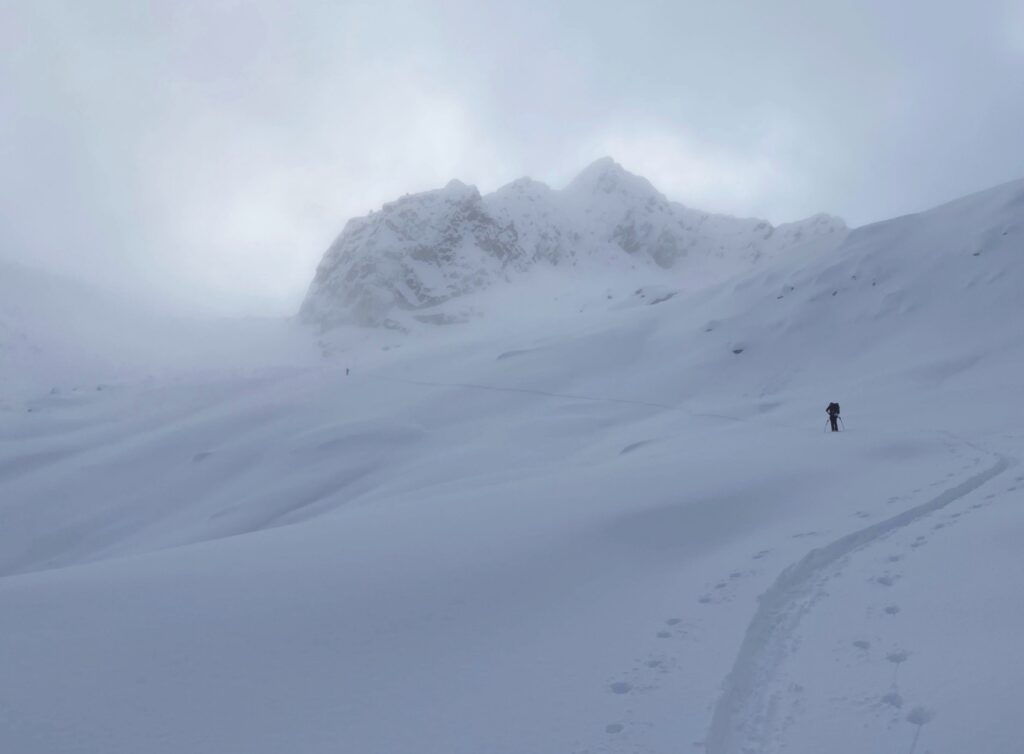
“I can’t believe they’re out this early, and it’s only March,” I said to Liam as we sat around the fire eating refried beans for supper. Thankfully we had no more meat to roast, which would have sent out invitations to every last bear in the kingdom—Grub’s up boys. Come and get it!
The following day we moved our camp to the alpine. The day was hot and still, a great quietness and a bloodless sky with a heat lamp behind it. But if nothing else mountain weather is fickle, and by the time we reached the meadows and set up the tent the wind was blowing strongly from the north west carrying snow, and already a sheen of frost had formed on the inside of the tent from our breath.
We got the fire going, fixed hashbrowns for supper, and sat around learning our poem. The wind dropped, the snow stopped, and a watery moon lay forlorn shadows on the long slopes below our tent. The only intrusion into the silence was the occasional crackle of the fire and our fanciful voices reciting The Listeners:
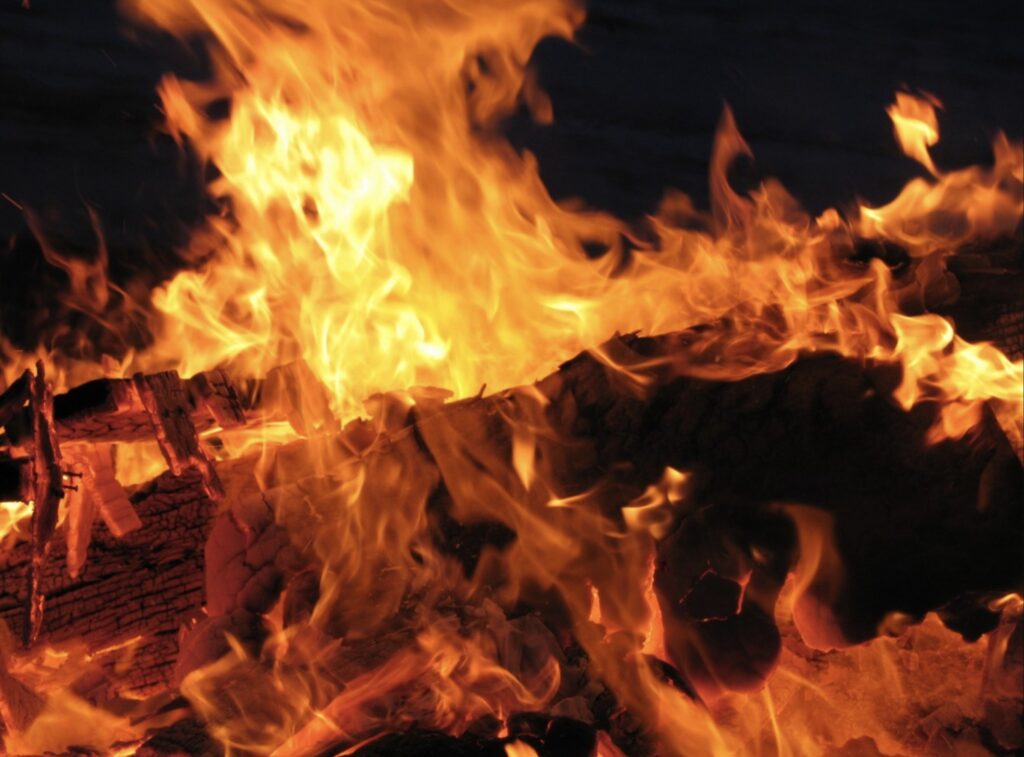
“For he suddenly smote on the door, even
Louder, and lifted his head: —
“Tell them I came, and no one answered,
That I kept my word,” he said.
Never the least stir made the listeners,
Though every word he spake—”
“It’s ‘spoke’, Dad.” Liam corrected me.
“No it’s not, it’s ‘spake’,” We were having a subdued alpine argument. “If it was ‘spoke’ then the line it rhymes with would end in ‘awoke’, and that’s bad English—‘from the one man left awoke . . . ! Here, see for yourself.” I handed Liam the page. “You read it.”
“H’m,” said he. Our recital continued:
“Though every word he sp-AAKE.”
He did it with phonetic aplomb just to annoy his father.
“Fell echoing through the shadowiness of the still house
From the one man left awake:
Aye, they heard his foot upon the stirrup,
And the sound of iron on stone,
And how the silence surged softly backward,
When the plunging hoofs were gone.”
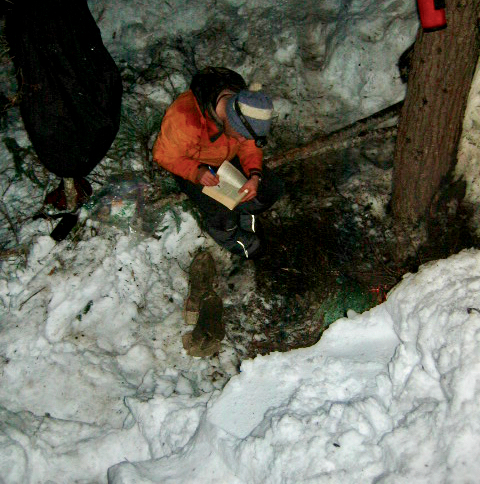
The moon turned the colour of a corpse, and the trees dotting the slopes grew dark as death. An owl hooted and fell silent, the firelight fluttered, Liam yawned and I shivered. It was time to crawl into the safety (perceived) of the tent.
We had a couple of hands of rummy even though it was hard to play cards with gloves on (and even harder to turn the pages of our books). We divided up the wine gums, had two squares of chocolate each—“Shall we finish the bar?” I suggested. Liam said we should save the rest for tomorrow.
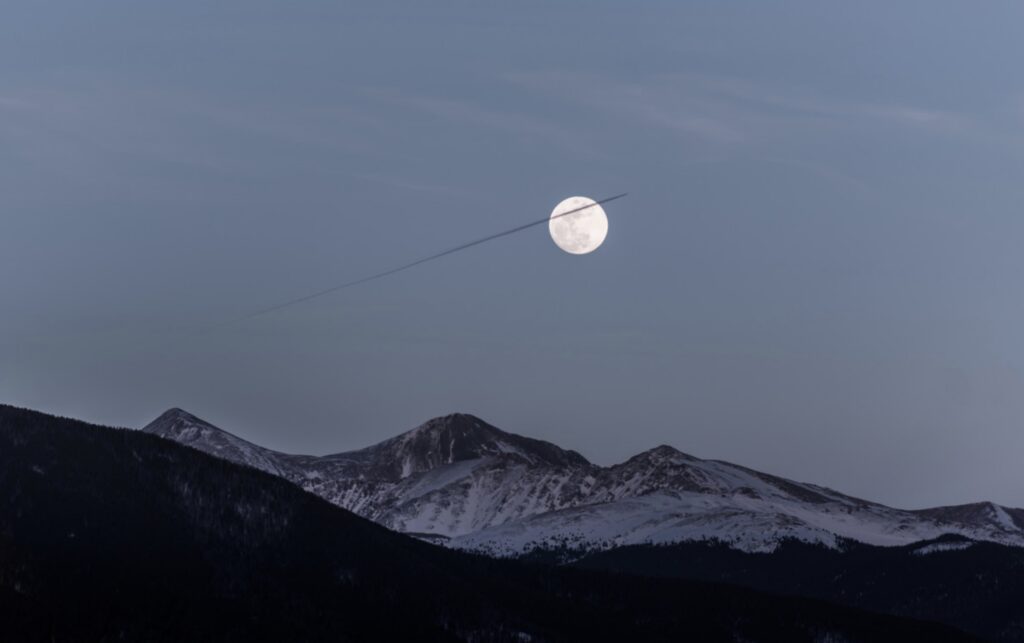
I waited for Liam to drop off then went outside and collected the shovel handle and my ski pole, heavy artillery to beat off night invaders. But Liam wasn’t quite asleep when I crawled back inside.
“What are you doing with those?” He sat up in his sleeping bag. He had caught me red-handed.
“Er. . . These? . . . Nothing.” And to prove it I threw the shovel handle and ski pole out the tent. Liam held me with his glittering eye for a long moment as if he were weighing me in the balance and finding me wanting. But he never said another word. I wish he had, allowing me more chance to fabricate and tie myself inside out. I hate the silent treatment, always have, find it unnerving personally. He was on to me, no doubt about it, and knew Dad’s liver was the colour of yesterday’s custard. Well, I make no bones about it, I never professed to be Dauntless Dick outdoor champion of the Shining Mountains and all that.
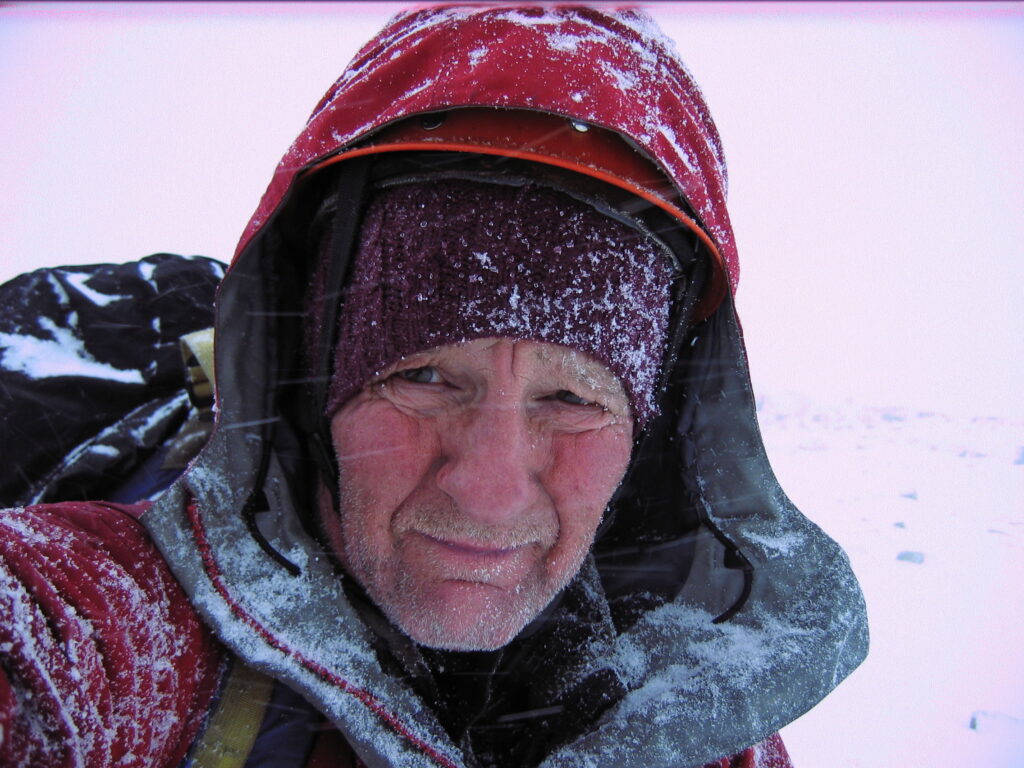
I made sure he was asleep before retrieving the weapons, and along with my open knife and one ski boot I lay out the arsenal beside my sleeping bag. I was ready for Griz should he pay us a visit. I’d bust his teeth with the shovel handle, poke his eyes with the ski pole, stab him with the Leatherman and kick him up the backside with the ski boot:
“Get the hell out of here, you mangy brute!” Liam would wake up just as I finished brushing hair and gore off my sleeping bag. “Why’s the tent got a big hole in it, Dad? And what IS that smell?” “Funny? I can’t smell anything.” “What were you doing, Dad?” He’d be wide awake now; I’d have to act nonchalant. Couldn’t frighten the lad. “Oh, the old plumbing you know. Had to get up for a pee. And would you believe it I tripped on my blasted ski boot and fell head first through the tent. Darn good job it’s not snowing, eh?” He’d settle back in his sleeping bag, and just when I thought he was falling asleep he would sit bolt upright like a startled rabbit “You haven’t been eating the chocolate, have you? You look awfully suspicious . . . ”
I lay absolutely still, listening to the terrifying silence. But there was no silence to speak of, for as I listened the night was alive with things that go ‘bump.’ I realized it was my own heart pounding, beating out the coward’s tattoo on my thin sleeping pad, like hearing the ticks of some mighty clock—thud thud thud—throwing out time with horrible hammer-blows.
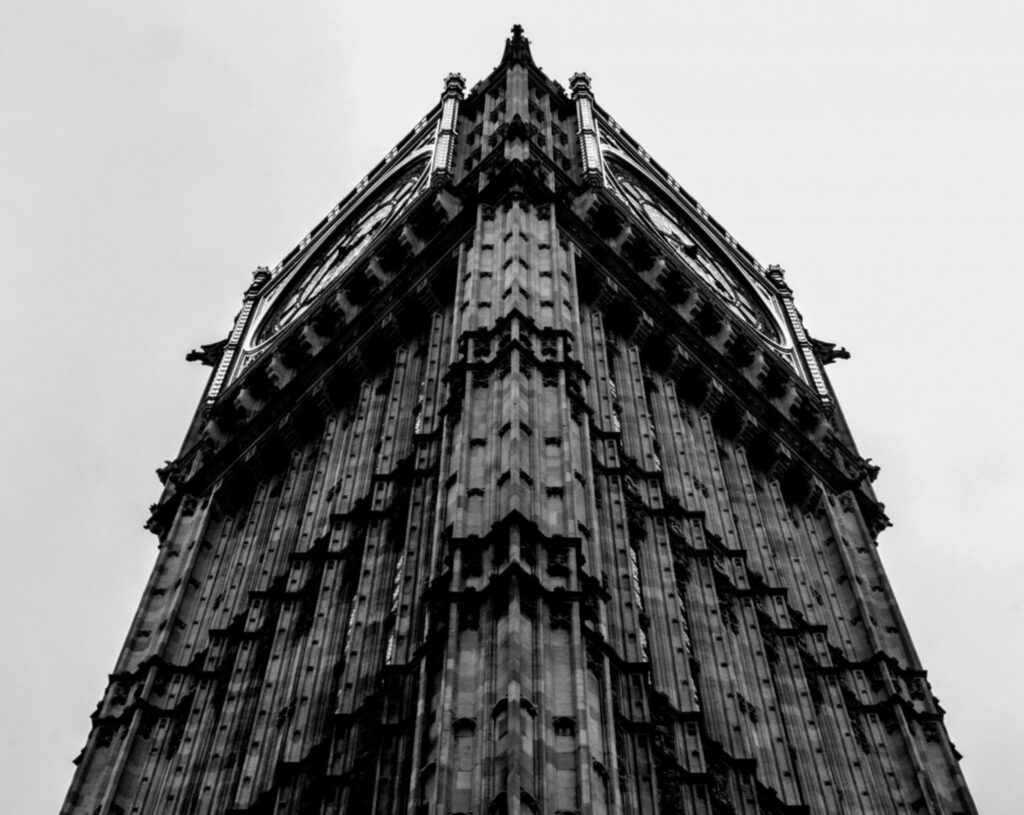
Cowards, as Shakespeare observed, “die many times before their deaths.” The way it was going with all our forays into the mountains, contending with avalanches, blizzards, crevasses, bears, not to mention blood poisoning and bad water, I was just a step ahead of the ginger tom with its nine lives. I reckoned the poem had me wound up worse than a clockwork soldier. Maybe scary poems before retiring were as bad as eating cheese before bed. Some claimed it gave you nightmares. But it hadn’t affected Liam in the slightest, for the sibilance of his breathing told me he’d sailed off in that wooden shoe—“on a river of crystal light / Into a sea of dew.”
I envied him, and not for the first time wished I wasn’t the one man left awake.
Drowsing gradually into unconsciousness, the roar of the nightmare bear grew fainter and fainter upon my dulling ear—until suddenly I shot up with a start. The tent was plum-full of sunlight—I was still alive, we were still alive—it was morning. It was time to get up.
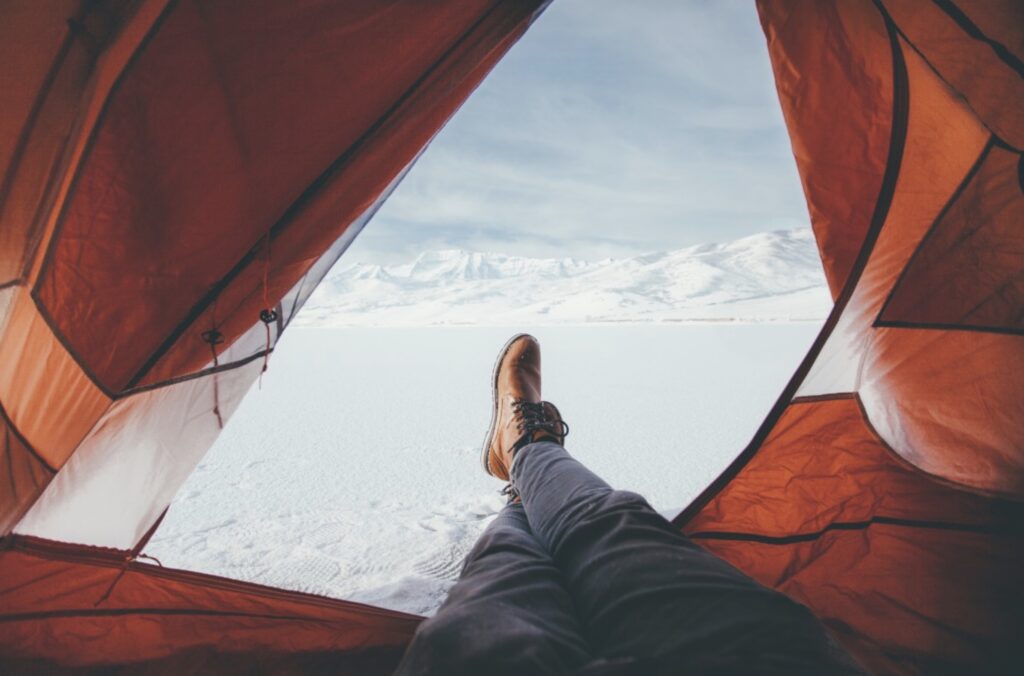
It had snowed in the night and the alpine meadows were as immaculate as a solid spread of billowing white clouds beneath the feet of angels. Smooth snow, no bear tracks, not a mark to sully the rolling land below us. Mosquito Spire, which we had climbed a couple of years before, looked like an African’s hat set at a jaunty tilt and shimmered in the brightness. Crystal air on a crystal day.
We did an inventory of grub: two packets of noodles, a tin of sardines, two granola bars, a spoonful of peanut butter, half a bar of chocolate, a little marmalade, and a slice of stale bread. Not enough to stay another night but enough for a decent breakfast.
We dined on noodles as we sat in the warm sun watching the meadows for signs of life. The world was ours, we owned it all—this magic Land of Punt.
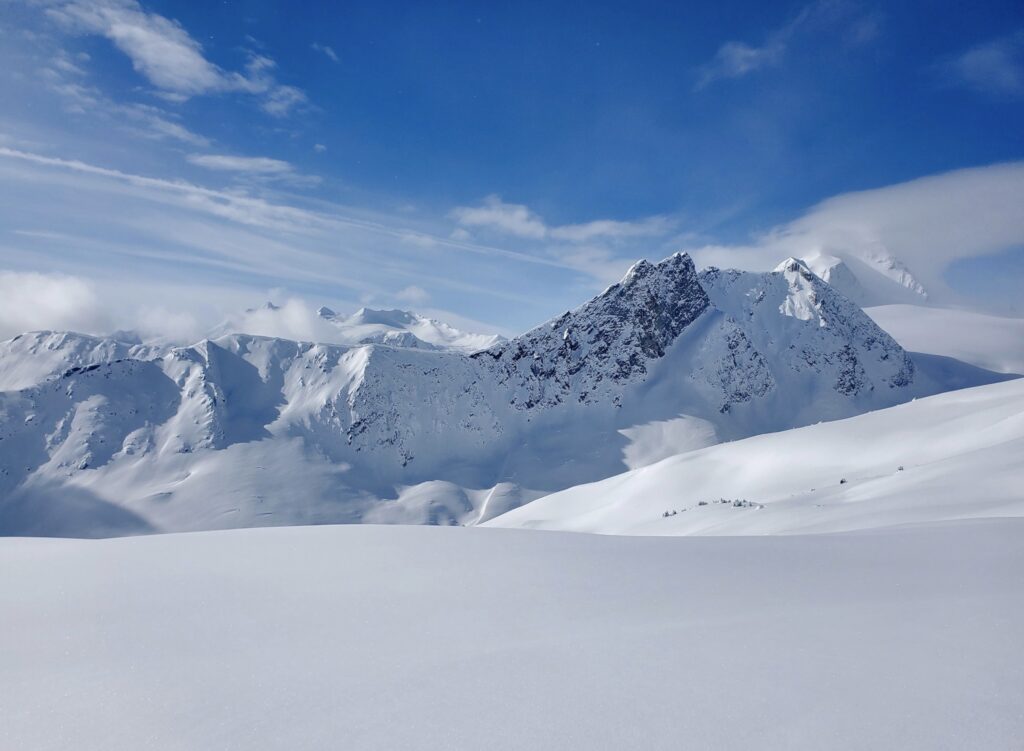
I was still hungry. There was the bread. I toasted it on the stove and marmaladed it with something of a flourish, slathering jam on my fleece pants in the process. But I didn’t care. It was a giddy day in the beautiful brightness. The grizzly had evaporated, and for the moment we are kings of all we see.
David Harrap // info@thejasperlocal.com
Jasper’s David Harrap is the author of The Littlest Hiker In The Canadian Rockies. Get it at the Jasper Yellowhead Museum and Archives.


